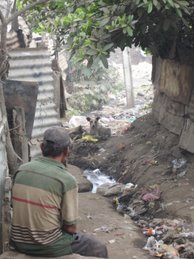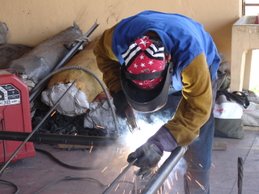Monday mornings, however, come early, and the climb to Sunday begins anew. At the Los Brasíles vocational school, instructor Mike Deibert and his students are already busy with the day's lesson, a new metalworking technique employed in the creation of ornamental hooks (for hanging keys, towels, plants, etc.) to be sold in local markets. The educational site is a functional mess. On one side piles of raw material – mostly long, unshaped metal rods – await creative hands, while the coal overspilling its bags across the “classroom” is ready to provide the needed heat. Directly in the middle, a late model car gets a well-deserved rest, having donated its innards to the observation of future mechanics, and a bright red welding machine sits restlessly alongside its half-finished, window-shaped security bars. The only observable uniformity is the coal dust spread evenly along the floor from wall to wall. It's a beautiful mess, full of potential.

What's now an established site providing self-esteem, jobs, and income to a community in need of each was an empty space just two years ago. The school's founder, Mike Deibert, has a background in elementary education and a longstanding interest in vocational skills and training. He wanted to combine these passions into a instructional program that would fit into Nicaragua's growing demand for skilled labor, and his search led him to Escuela Faro de Luz, which offered an open space, validity in the community's eyes, and access to qualified students. Mike's program includes training in metalwork, auto mechanics, and welding but remains flexible to further growth. What's stressed, however, isn't solely skill in labor but the development of the individual. Income alone won't change a community, and Mike's lessons are designed to reinforce the importance of work ethic, honesty, integrity, and teamwork so that the benefits are also apparent outside the workplace. On Sundays, for instance.

Nica HOPE's connections to Los Brasíles vocational school are deep indeed. Touring the site and learning of its successes and shortcomings provided the inspiration that eventually led to Nica HOPE's founding, and future schools will be designed based first upon local need but also based upon lessons learned at Los Brasíles. As such, a Nica HOPE representative will be observing classes, asking questions, and taking notes in order to learn first-hand the specifics of vocational training. In the near future, Nica HOPE will provide assistance in the post-instruction, occupational aspect of Mike's charge by developing outlets for product sales and job placement. And the symbiotic nature of the relationship will uplift us all, especially those most in need.
It's Friday afternoon and work week is winding down. Looking forward to Sunday.
Jordan Hooper
Managua, Nicaragua




No comments:
Post a Comment